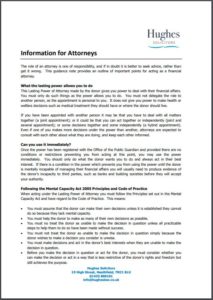If you have been asked by someone to act for them under a power of attorney, and have accepted, then you have been placed in a position of great trust and responsibility.
You must act with honesty, integrity and in good faith. You must keep the donor’s affairs confidential unless disclosure is required by the Office of the Public Guardian or an order from the Court.
Any decision must be taken in the donor’s best interests. This is not always easy and you must consider all the relevant circumstances, particularly:
- the likelihood of the donor recovering in the foreseeable future and being able to make the decision;
- the donor’s past and present wishes and feelings;
- the donor’s beliefs and values that would be likely to influence their decision if they had capacity; and
- other factors that the donor would be likely to consider if they were able to do so.
When acting under a Lasting Power of Attorney, you must also follow the principles set out in the Mental Capacity Act and have regard to the Code of Practice, which means:
- You must assume that the donor can make their own decisions unless it is established they cannot do so because they lack mental capacity.
- You must help the donor to make as many of their own decisions as possible.
- You must not treat the donor as unable to make the decision in question unless all practicable steps to help them to do so have been made without success.
- You must not treat the donor as unable to make the decision in question simply because the donor wishes to make a decision you consider is unwise.
- You must make decisions and act in the donor’s best interests when they are unable to make the decision in question.
- Before you make the decision in question or act for the donor, you must consider whether you can make the decision or act in a way that is less restrictive of the donor’s rights and freedom but still achieves the purpose.
 If you are uncertain about a particular decision or any aspect of your responsibilities, then it is better to seek legal advice than risk getting it wrong.
If you are uncertain about a particular decision or any aspect of your responsibilities, then it is better to seek legal advice than risk getting it wrong.
Hughes Solicitors has produced a helpful guidance note which provides a more detailed overview of the important points for anyone who is acting as a financial attorney. Click here to download a copy of our Information for Attorneys.
For further information on making a will, please contact Dee Benians in our private client team in Heathfield, East Sussex on 01435 890 101 or email deebenians@hugheslaw.co.uk.
This article is for general information purposes only and does not constitute legal or professional advice. Please note that the law may have changed since the date this article was published.


